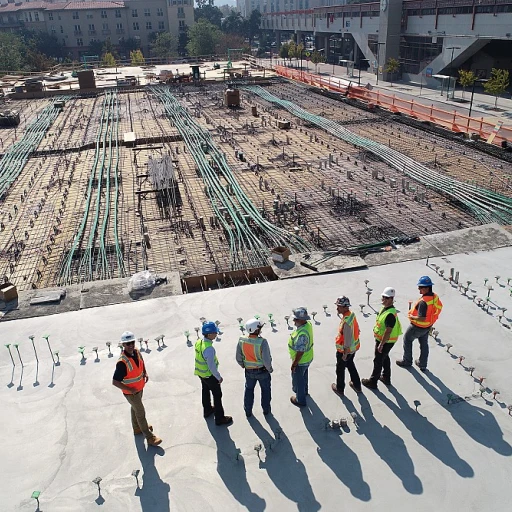
Understanding Employee Assessment in Tech
The Importance of Understanding Employee Assessment in Tech
For organizations striving to secure top talent in the technology sector, understanding employee assessments is pivotal. This understanding serves as the backbone of an effective hiring process, directly impacting employee engagement and overall performance. Employee assessments help pinpoint strengths areas and areas improvement, guiding the growth and development of employees. They play a crucial role in talent management by identifying skills gaps and setting clear development plans to address them. Such assessments also offer a framework for comprehensive employee performance reviews, ensuring that performance management is both consistent and fair. The type of assessment tools and techniques utilized can significantly affect the quality of the hiring process. When integrated effectively, skills assessments, degree feedback, and evaluations not only measure employee skills but also contribute to the career development of team members. For readers interested in delving deeper into effective employee assessment tools, visit our blog on effective employee assessment tools. With these evaluations in place, organizations can achieve a more accurate understanding of their team's capabilities and performance. This understanding is crucial in setting realistic goals for both employees and the organization, fostering an environment conducive to continuous improvement and growth.Key Challenges in Tech Hiring
Overcoming Obstacles in Tech Recruitment
In the fast-paced world of technology, hiring the right talent is crucial for organizations aiming to stay competitive. However, the process is fraught with challenges that can hinder effective recruitment and employee performance. Understanding these hurdles is the first step towards improvement.
Identifying Skill Gaps
One of the primary challenges in tech hiring is identifying the specific skills required for a role. With technology evolving rapidly, the skills needed today might not be relevant tomorrow. This makes skills assessments a critical component of the hiring process. Organizations must ensure that their assessment tools are up-to-date and aligned with industry standards to accurately evaluate employee skills.
Ensuring Cultural Fit
While technical skills are essential, cultural fit is equally important. Employees who align with the company’s values and culture are more likely to contribute positively to the team and achieve their career development goals. Balancing technical skills with cultural fit can be challenging, but it is necessary for long-term employee engagement and retention.
Streamlining the Assessment Process
The assessment process can be time-consuming and resource-intensive. Organizations often struggle with managing the volume of applications and conducting thorough evaluations. Implementing a robust performance management system can help streamline this process, ensuring that assessments are efficient and effective.
Providing Constructive Feedback
Feedback is a crucial part of the assessment process, yet it is often overlooked. Constructive feedback helps employees understand their strengths areas and areas improvement, guiding their development plans. Regular performance reviews and 360-degree feedback can foster a culture of continuous improvement and growth.
For more insights on enhancing employee engagement in tech hiring, explore affordable ways to boost employee engagement.
Innovative Assessment Tools and Techniques
Exploring Modern Tools for Employee Evaluation
In the ever-evolving landscape of tech hiring, organizations are increasingly turning to innovative assessment tools and techniques to enhance their employee evaluation processes. These tools not only streamline the assessment process but also provide deeper insights into employee skills and potential areas for improvement. By leveraging technology, companies can make more informed decisions that align with their talent management goals.
One of the most significant advancements in this area is the use of skills assessments that are tailored to the specific needs of tech roles. These assessments help identify the strengths and areas for improvement of potential hires, ensuring that the right talent is brought into the team. Additionally, they provide a foundation for future career development and development plans once the employee is onboarded.
Integrating Feedback Mechanisms
Feedback is a crucial component of any effective assessment process. Modern tools incorporate 360-degree feedback mechanisms, allowing for a comprehensive evaluation of an employee's performance from multiple perspectives. This holistic approach not only aids in performance management but also fosters a culture of continuous improvement and employee engagement.
Moreover, these tools often include features for setting and tracking performance goals, providing employees with clear objectives and a roadmap for growth. This alignment between individual goals and organizational objectives is key to driving employee performance and satisfaction.
Balancing Technical Skills with Cultural Fit
While technical skills are paramount in tech hiring, it's equally important to assess cultural fit. Innovative assessment tools now offer insights into an employee's compatibility with the company's values and team dynamics. This balance is crucial for long-term success and employee retention.
For more insights on how to effectively balance these aspects during the hiring process, consider exploring key questions to ask during an internal tech interview. These questions can help in evaluating both technical competencies and cultural alignment.
By embracing these innovative tools and techniques, organizations can enhance their employee assessments, leading to better hiring decisions and a more cohesive team environment.
Balancing Technical Skills and Cultural Fit
Aligning Employee Capabilities with Organizational Values
Achieving a balanced hiring process in the tech sector requires a focus not only on technical skills but also on cultural fit. Organizations are increasingly recognizing the value of workplace culture and how it affects employee performance, engagement, and satisfaction.
Cultural fit refers to how well an employee's attitudes, beliefs, and values align with the organizational culture. Here are some strategies to ensure a balance between technical skills and cultural alignment during the hiring process:
- Define Cultural Values: Clearly articulate the core values and goals of the organization. This definition helps guide the assessment process and sets the stage for evaluating how well a candidate may integrate into the existing corporate environment.
- Incorporate Cultural Assessments: Use employee assessments that evaluate a candidate’s values and behavior. Incorporate questions and situational judgments that reveal how a potential hire might handle real-world situations within the company’s cultural context.
- Enhance Interview Techniques: Modify the interview process to include questions that focus on behavioral tendencies and cultural adaptability. Scenario-based questions can help gauge the candidate’s approach to working within a team or handling conflict resolution.
- Engage Current Employees: Current team members can provide invaluable insights into cultural fit by participating in the evaluation process. Their feedback can highlight areas where a candidate’s personal and professional traits might align with the team dynamics.
Balancing technical skills with cultural compatibility is essential in areas where innovation thrives. Organizations are not only looking to fill knowledge gaps but also to nurture an environment that promotes overall growth and employee development. By aligning skills assessment tools with cultural evaluation techniques, tech companies can positively impact their performance management and talent development strategies, ultimately leading to more effective employee assessments and improved organizational performance.
In recognizing the multifaceted nature of hiring, assessing both technical skills and cultural fit acts as a catalyst for long-term success in tech industries. Companies looking to optimize their talent management practices should foster an assessment process that respects both technical acumen and alignment with the company’s mission and values.
Case Studies: Successful Employee Assessment in Tech
Real-World Examples of Effective Assessment Strategies
In the competitive world of tech hiring, organizations have increasingly turned to employee assessments as a means to refine their recruitment processes and improve overall performance management. The following case studies highlight successful strategies that leverage innovative tools and comprehensive techniques to evaluate and develop talent.- Innovative Skills Assessment Implementation: One tech company revolutionized their hiring process by integrating cutting-edge skills assessments. By employing a mix of coding challenges and real-world problem-solving scenarios, they accurately gauged candidate capabilities and pinpointed areas for improvement. The result? An enhanced ability to match the right talent with the right positions, leading to more cohesive teams and higher employee engagement.
- Balancing Technical Skills and Cultural Fit: Another organization successfully combined technical assessments with cultural evaluations to ensure a harmonious blend of both hard and soft skills within their teams. They utilized a performance review system that not only measured technical proficiency but also prioritized alignment with company values and team dynamics. This approach fostered a positive work environment conducive to growth and career development.
- 360-Degree Feedback for Continuous Improvement: Recognizing the need for continuous employee development, one company adopted a 360-degree feedback system. By collecting input from multiple sources—peer reviews, managerial assessments, and self-evaluations—they gained comprehensive insights into each employee's strengths and areas for improvement. This data informed personal development plans and talent management strategies, ultimately boosting employee performance and organizational success.
Future Trends in Employee Assessment for Tech
Emerging Trends Shaping Future Assessments
The landscape of employee assessments continues to evolve, driven by technological advancement and changing workforce dynamics. Organizations are increasingly turning to cutting-edge tools to enhance their assessment processes, ensuring they stay relevant and effective.
Integrating Artificial Intelligence in Assessments
Artificial Intelligence (AI) is reshaping how employee assessments are conducted. By leveraging AI-powered tools, organizations can streamline the assessment process, enabling more precise and objective evaluation of employee skills. AI not only automates repetitive tasks but also provides valuable insights into areas improvement, helping teams craft customized development plans.
Emphasizing Continuous Feedback and Development
There is a growing emphasis on continuous feedback rather than traditional annual performance reviews. This trend empowers employees through regular assessment tools, fostering an environment where feedback is not only timely but constructive. Continuous feedback loops are crucial for employee engagement and performance management, encouraging growth and skill development within the organization.
The Rise of Gamified Assessment Techniques
Gamification is becoming an innovative approach in employee assessments. By transforming assessments into engaging and interactive experiences, organizations can assess not just technical skills but also evaluate employee engagement and cultural fit. Gamified techniques bring an element of fun, which can enhance motivation and provide a holistic view of employees' strengths areas and potential.
Leveraging Data Analytics for Talent Management
The use of data analytics in assessments is increasingly significant, offering a deeper understanding of employee performance and potential. Advanced analytics provide insights into employee assessments, guiding talent management decisions and identifying potential areas for improvement. Data-driven evaluations help align individual goals with organizational objectives, enhancing the overall performance management system.
Fostering Career Development with Tailored Learning Paths
Future employee assessments will likely focus on personalized learning paths, ensuring employees are equipped with the skills they need to advance in their careers. Skills assessments will be critical in identifying gaps and opportunities, allowing organizations to tailor development plans that align with career goals and organizational needs.
The future of employee assessment in tech is undoubtedly promising, with innovation at its core, guiding organizations towards more effective, fair, and engaging evaluation processes.













